Nice Place To Study MBBS
Study In Lithuania
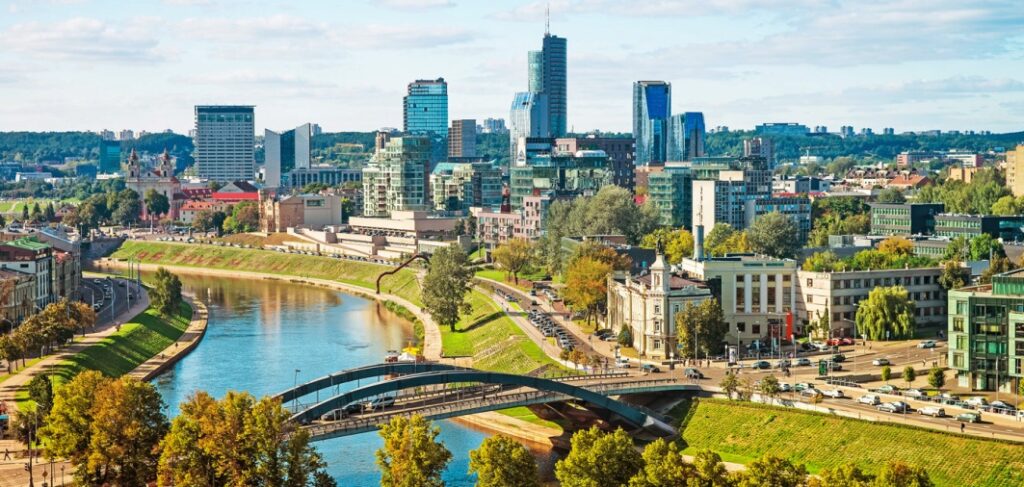
Lithuania officially the Republic of Lithuania is a country in the Baltic region of Europe. Lithuania is one of the Baltic States. The country is situated along the south-eastern shore of the Baltic Sea, to the southeast of Sweden and Denmark. It is bordered by Latvia to the north, Belarus to the east and south, Poland to the south, and Kaliningrad Oblast (a Russian exclave) to the southwest. Lithuania has an estimated population of 2.8 million people as of 2019, and its capital and largest city are Vilnius. Other major cities are Kaunas and Klaipėda. Lithuanians are Baltic people. The official language, Lithuanian, is one of only two living languages in the Baltic branch of the Indo-European language family, the other being Latvian.
Lithuania is a high-income advanced economy with a very high Human Development Index, a very high standard of living and performs favourably in measurements of civil liberties, press freedom, internet freedom, democratic governance and peacefulness. Lithuania is a member of the European Union, the Council of Europe, euro zone, Schengen Agreement, NATO and OECD. It is also a member of the Nordic Investment Bank, part of Nordic-Baltic cooperation of Northern European countries, and is classified as a Northern European country by the United Nations
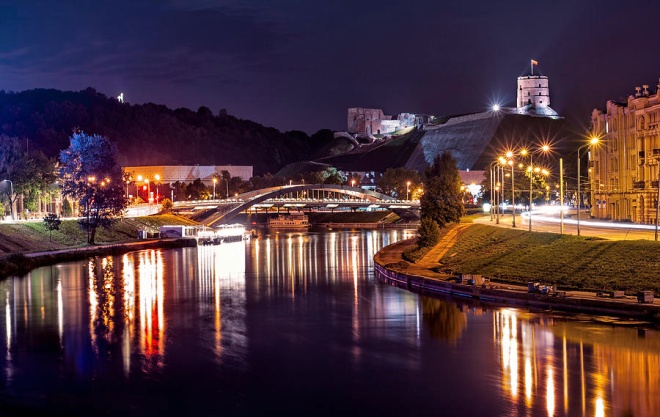
Tourism
Statistics of 2016 showed that 1.49 million tourists from foreign countries visited Lithuania and spent at least one night in the country. The largest number of tourists came from Germany (174,8 thousand), Belarus (171,9 thousand), Russia (150,6 thousand), Poland (148,4 thousand), Latvia (134,4 thousand), Ukraine (84,0 thousand), and the UK (58,2 thousand).
The total contribution of Travel & Tourism to country GDP was EUR 2,005.5mn, 5.3% of GDP in 2016, and is forecast to rise by 7.3% in 2017, and to rise by 4.2% pa to EUR 3,243.5mn, 6.7% of GDP in 2027. Hot air ballooning is very popular in Lithuania, especially in Vilnius and Trakai. Bicycle tourism is growing, especially in Lithuanian Seaside Cycle Route. EuroVelo routes EV10, EV11, EV13 go through Lithuania. Total length of bicycle tracks amounts to 3769 km (of which 1988 km is asphalt pavement).
Nemunas Delta Regional Park and Žuvintas biosphere reserve are known for birdwatching.
Domestic tourism has been on the rise as well. Currently there are up to 1000 places of attraction in Lithuania. Most tourists visit the big cities—Vilnius, Klaipėda, and Kaunas, seaside resorts, such as Neringa, Palanga, and Spa towns – Druskininkai, Birštonas.

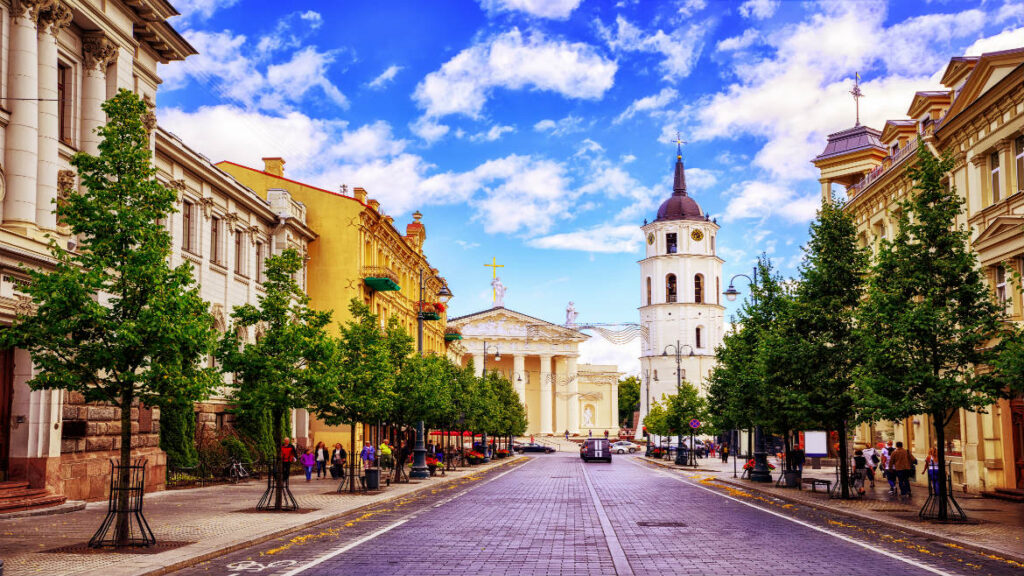
Transport
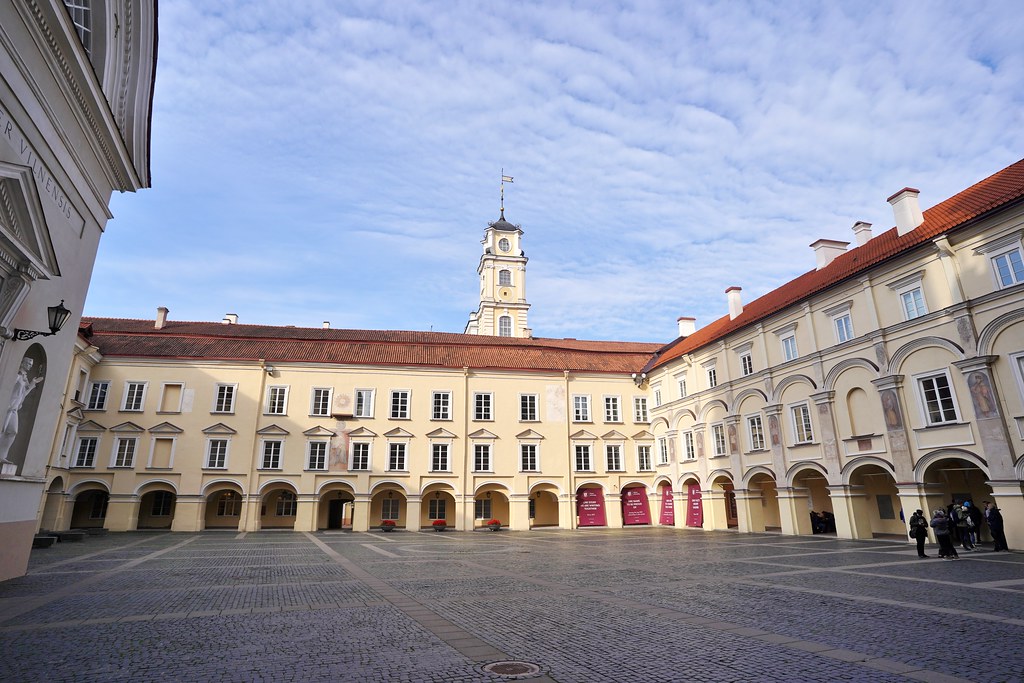
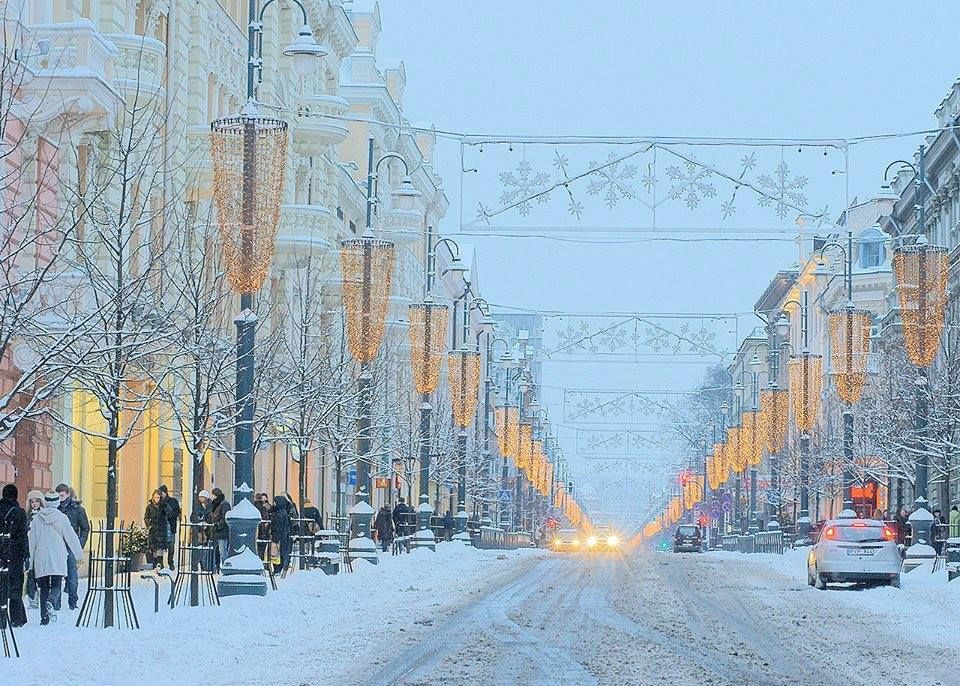
Lithuania received its first railway connection in the middle of the 19th century, when the Warsaw – Saint Petersburg Railway was constructed. It included a stretch from Daugavpils via Vilnius and Kaunas to Virbalis. The first and only still operating tunnel was completed in 1860.
Lithuanian Railways’ main network consists of 1,762 km (1,095 mi) of 1,520 mm (4 ft 11.8 in) Russian gauge railway of which 122 km (76 mi) are electrified. This railway network is incompatible with European standard gauge and requires train switching. However, Lithuanian railway network also has 115 km (71 mi) of standard gauge lines. More than half of all inland freight transported in Lithuania is carried by rail. The Trans-European standard gauge Rail Baltica railway, linking Helsinki–Tallinn–Riga–Kaunas–Warsaw and continuing on to Berlin is under construction. In 2017, Lietuvos Geležinkeliai, a company that operates most railway lines in Lithuania, received EU penalty for breaching EU’s antitrust laws and restricting competition
Vilnius University
Welcome to Vilnius University – the oldest and largest Lithuanian higher education institution.
Since its establishment in the 16th century, Vilnius University, as integral part of European science and culture has embodied the concept¬ of a classical university and the unity of studies and research.
Vilnius University is an active participant in international scientific and academic activities and boasts many prominent scientists, professors and graduates. Scientific development and the expanding relations with global research centres have contributed to the variety of research and studies at Vilnius University.
With the support of social partners, the university educates globally–minded specialists who successfully integrate in the modern European community.
Why Choose Vilnius University
Vilnius University is a classical university with over 430 years of academic traditions and the widest range of study programmes in Lithuania.
The university offers an academic environment focused on excellence in research and teaching.
Vilnius University is 1st in Lithuania according to national ranking. It is the most popular and most acknowledged higher education establishment among Lithuani¬an secondary school graduates.
Vilnius University is Lithuania’s leading academic institution, ranked among the top 500 universities worldwide (QS).
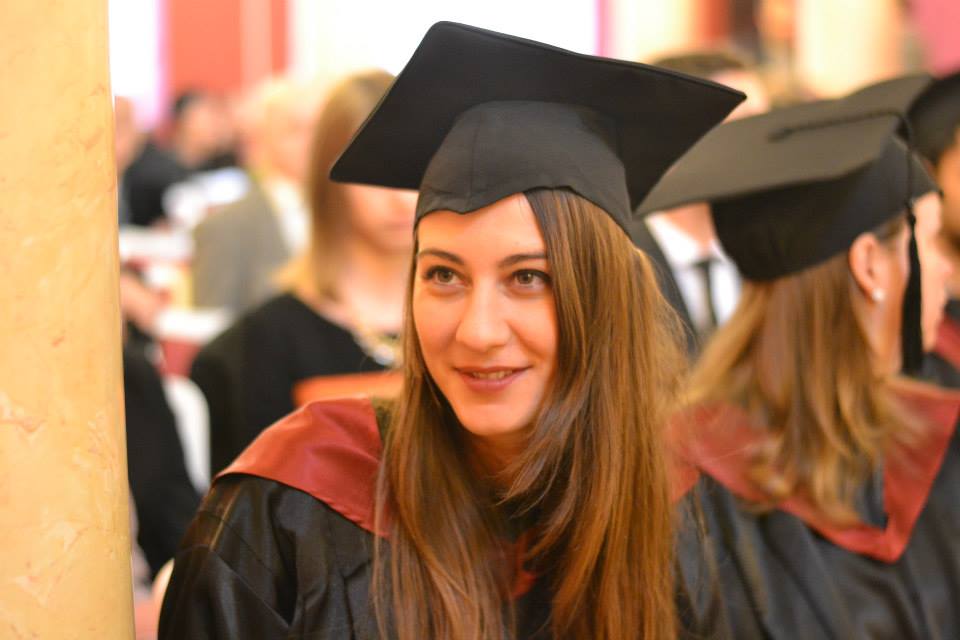
Mission
The mission of Vilnius University is to create, accumulate and disseminate knowledge by ensuring continuity of authentic university culture distinguished by the atmosphere where old traditions and new ideas enrich each other.
Freedom of thought and diversity of opinions are the main values of the University community. A unity of research and studies is the core principle of the overall activity of the University.
The University should distinguish itself by a broad spectrum of fundamental and applied research. It should seek to assume the leading position among other Lithuanian institutions in all research areas that are essential to the very nature of a comprehensive University and set itself the goal of international excellence in the interdisciplinary research. The University should be committed to the mission of opening the doors and providing universal education for the most talented young people from all districts of Lithuania and educating active and responsible specialists, who demonstrate the need to expand their knowledge and improve professionally and who are able to learn throughout their lifetime. The University should seek that the quality of all forms of studies conforms to the modern culture and technologies and pertains to the needs of the state and society.

Vision
To position and distinguish itself in European research and education area by top level research, which should be sustained by University’s research teams of international acclaim and new teams, as well as to ensure annually increasing involvement in European research and educational programmes;
to ensure that the balanced development and interaction of research in humanities, social, physical, biomedical and technological sciences remains the most outstanding feature of the University, which essentially differentiates it from other Lithuanian establishments of higher education and research;
to initiate and actively implement the projects of value for the economic development of the country, which would encourage effective co-operation of scientific and educational institutions with high technology companies and create favourable conditions and environment for innovations and entrepreneurship.
To create a well-functioning quality assurance system which would guarantee effective monitoring of the existing study programmes and development of new programmes and which would encourage the implementation of advanced teaching methods and tools. The system should ensure that generic and specific competencies and skills of University graduates are in consistency with the needs and tendencies in the economy, culture and labour market of the country;
To significantly expand non-consecutive, distance and other flexible study forms and methods and become the centre of continuous professional improvement and lifelong learning, which plays an important role in transition of the country toward knowledge-based society.
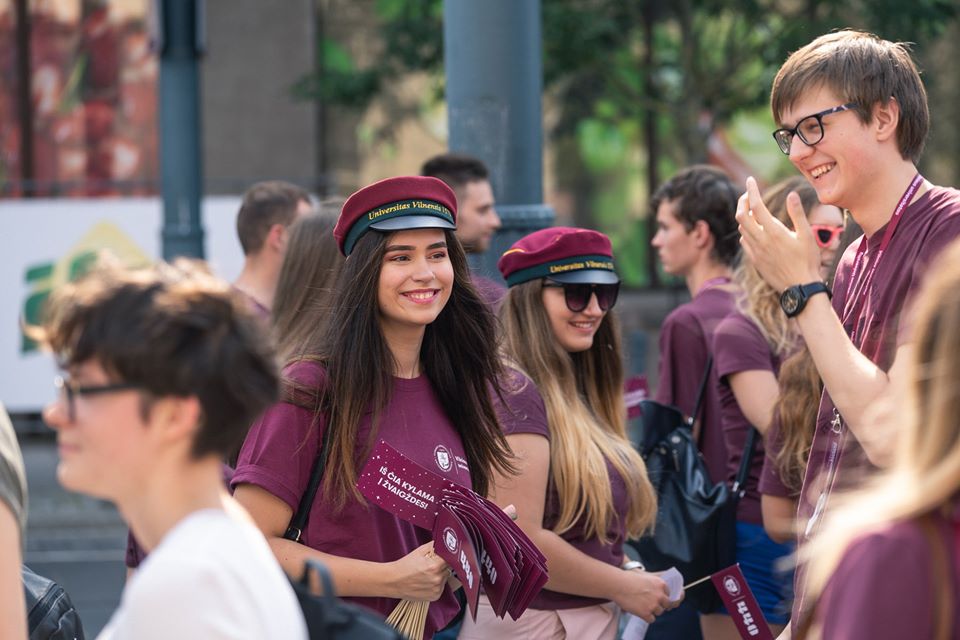
Faculties, Institutes, Centres & Other Departments
Business School
Faculty of Chemistry and Geosciences
Faculty of Communication
Faculty of Economics and Business Administration
Faculty of History
Faculty of Law
Faculty of Mathematics and Informatics
Faculty of Medicine
Faculty of Philology
Faculty of Philosophy
Faculty of Physics
Institute of International Relations and Political Science
Kaunas Faculty
Life Sciences Center
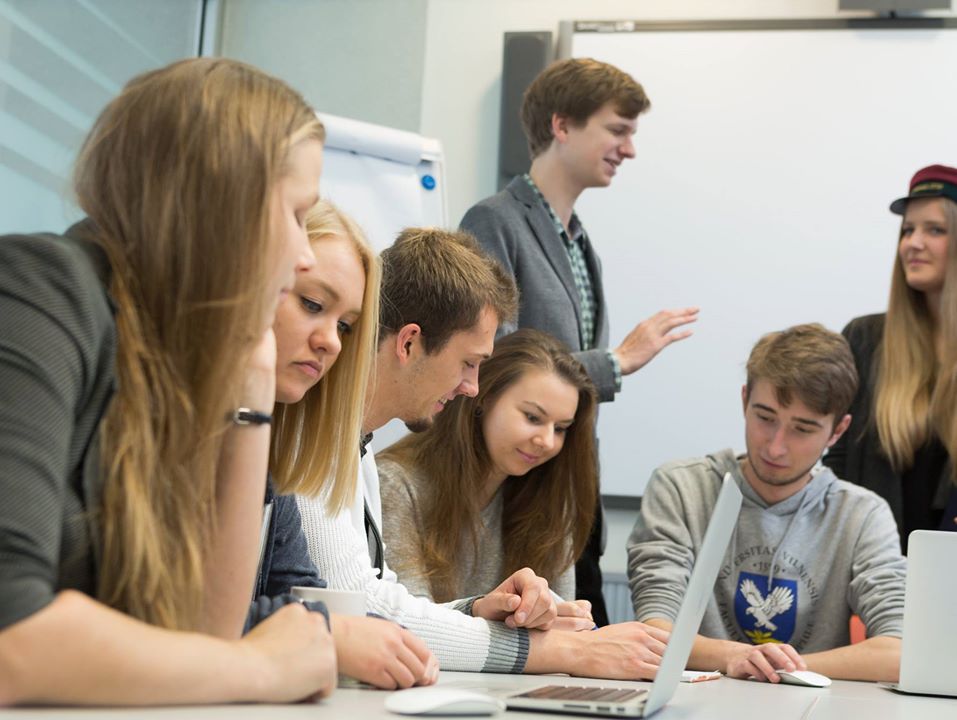
Other Divisions
Botanical Garden
Centre of Information Technology Development
Centre of Property Management and Services
Conference, seminar and leisure centre Romuva
Cultural Centre
Health and Sport Centre
Library
Museum
Publishing House
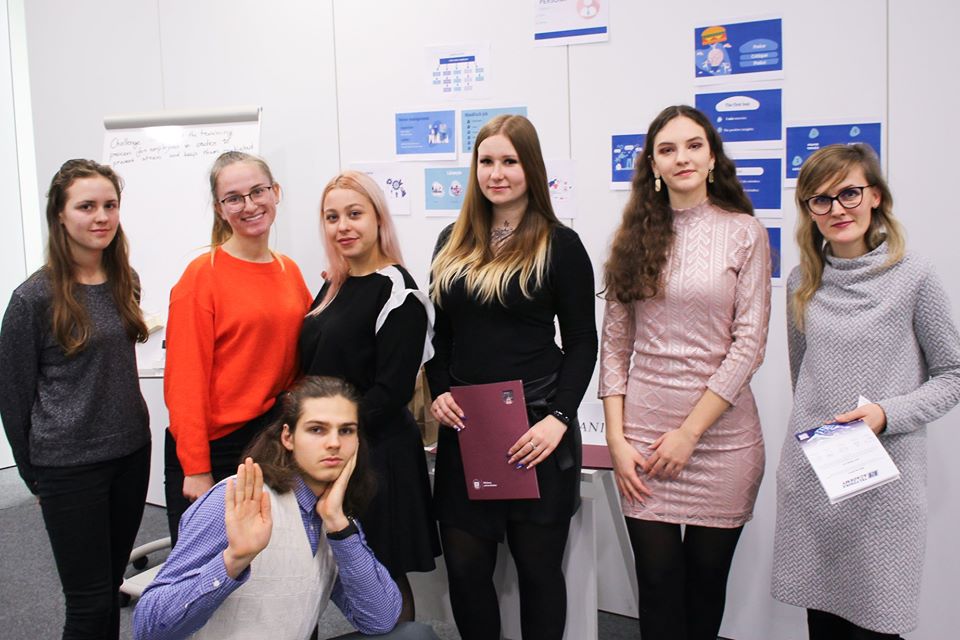
Facts and Figures
| Students | 19996 |
|---|---|
| Undergraduate | 11720 |
| Integrated | 2941 |
| Graduate | 3470 |
| Professional Studies (Pedagogical) | 101 |
| Postgraduate | 796 |
| MS’s in residency | 830 |
| Non-degree students | 489 |
| International Students | 1233 (814 full-time) |
| GRADUATES OF 2018/2019 | 3778 |
Data: 1 March, 2020
Admission Of 2019
Data: 1 September, 2019
Study Programmes
Bachelor Programmes in English and Russian
Master Programmes in English and Russian
Document Required Admission
10th & 12th Marksheet
Motivation Letter (1200-4000 characters)
IELTS 5.5 Bands
Application Fees Receipt
1 Recommendation Needed
Passport
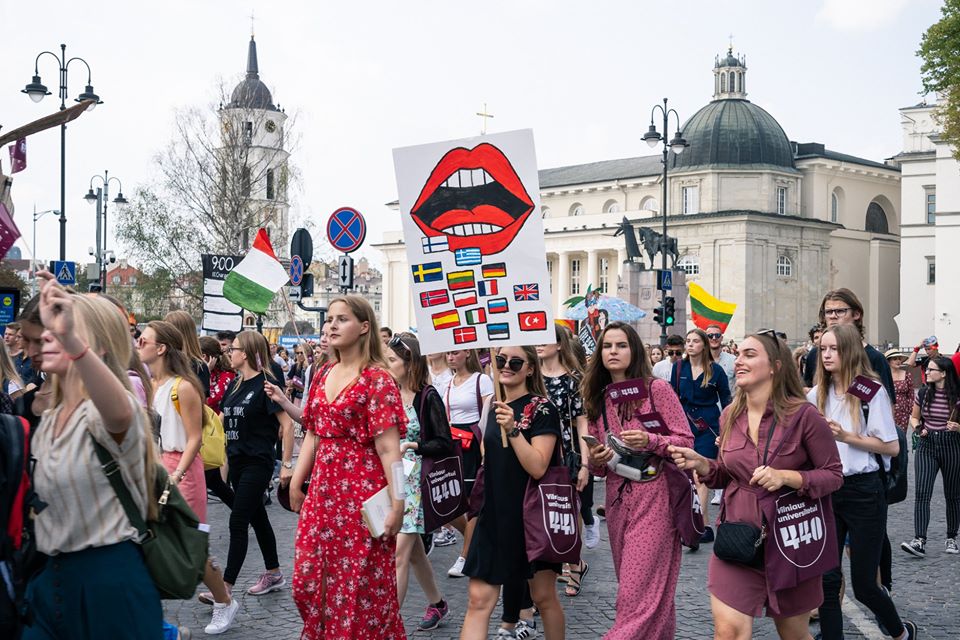
Medical Specialization- Residency
Residency is a stage of graduate medical training:
Residency in medicine (further residency) is the study in medicine, designed for the physicians seeking to acquire or to change the specialization of the professional qualification in medical practice. After the completion of studies, the graduates receive a certificate stating the professional qualification of either clinical specialist or general practitioner.
Residency in odontology (further residency) is the study in dentistry, which leads the graduates to the certificate of professional qualification of an odontology specialist.
You can start residency studies at Vilnius University only if your Lithuanian is at B1 level according to the Common European Framework of Refence for Languages. Studies begin on September 1st every year.
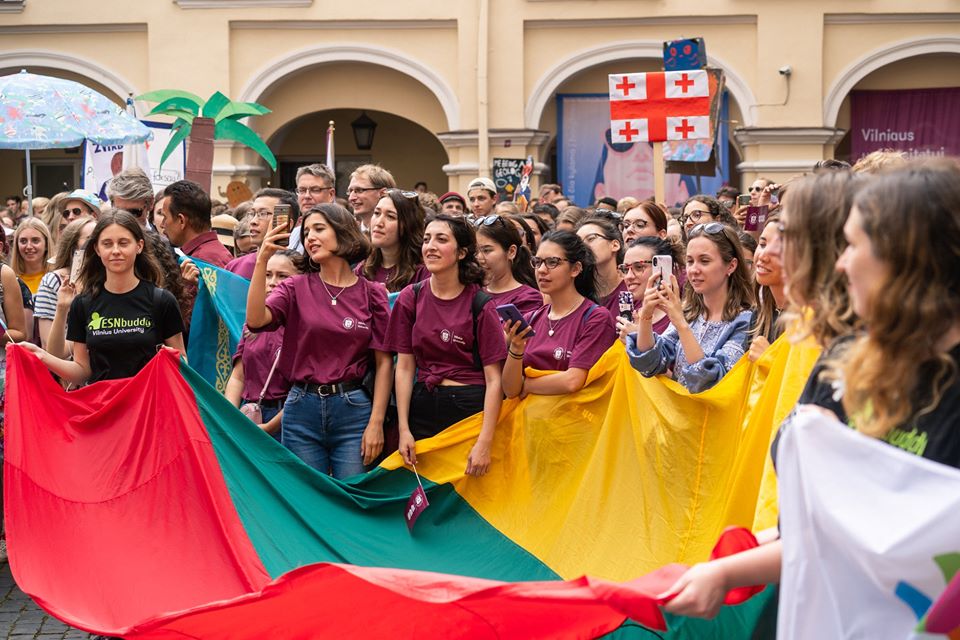
Main features of residency studies:
Full-time;
Duration 3-6 years, depending on the programme (a year is equal to 60 ECTS);
Includes theoretical courses and traineeships/practical placements;
Is arranged at the university, university hospital or institution chosen and accredited by the university.
Vilnius University runs 63 residency programmes
Residency in Medicine
Abdominal Surgery (5 years)
Alergology and Clinical Immunology (4 years)
Anaesthesiology and Reanimatology (4 years)
Cardiac Surgery (5 years)
Cardiology (4 years)
Clinical Toxicology (3 years)
Dermatovenerology (4years)
Dietology (3 years)
Emergency Medicine (5 years)
Endocrinology (4 years)
Family Medicine (3 years)
Forencis Medicine (4 years)
Gastroenterology (4years)
Genetics (4 years)
Geriatrics (4 years)
Hematology (4 years)
Infectious Diseases (4 years)
Internal Diseases (5 years)
Laboratory Medicine (4 years)
Maxillofacial Surgery (5 years)
Nephrology (4 years)
Neurology (4 years)
Neurosurgery (5 years)
Obstetrics and Gynaecology (4 years)
Occupational Medicine (4 years)
Oncology-Chemotherapy (5 years)
Oncology-Radiotherapy (4 years)
Ophthalmology (3 years)
Orthopaedics and Traumatology (5 years)
Otorhinolaryngology (3 years)
Pathology (4 years)
Physical Medicine and Rehabilitation (3 years)
Plastic and Reconstructive Surgery (5 years)
Prosthodontics (3 years)
Psychiatry (4 years)
Pulmonology (4 years)
Radiology (4 years)
Rheumathology (4 years)
Sport Medicine (3 years)
Surgery (5 years)
Thoracic Surgery (5 years)
Urology (5 years)
Vascular Surgery (5 years)
Child and Adolescent Psychiatry (4 years)
Paediatrics and Neonatology (5 years)
Paediatrics and Paediatric Alergology (5 years)
Paediatrics and Paediatric Cardiology (6 years)
Paediatrics and Paediatric Endocrinology (5 years)
Paediatrics and Paediatric Gastroenterology (5 years)
Paediatrics and Paediatric Hematology (5 years)
Paediatrics and Paediatric Infectious Diseases (5 years)
Paediatrics and Paediatric Intensive Care (6 years)
Paediatrics and Paediatric Nephrology (5 years)
Paediatrics and Paediatric Neurology (6 years)
Paediatrics and Paediatric Pulmonology (5years)
Paediatrics and Paediatric Rheumathology (5 years)
Paediatrics Surgery (5 years)
Residency in Odontology
Endodontology (3 years)
Oral Surgery (3 years)
Orthodontics (3 years)
Paediatrics Odontology (3 years)
Periodontology (3 years)
Prosthodontics (3 years)
Cost Of Living
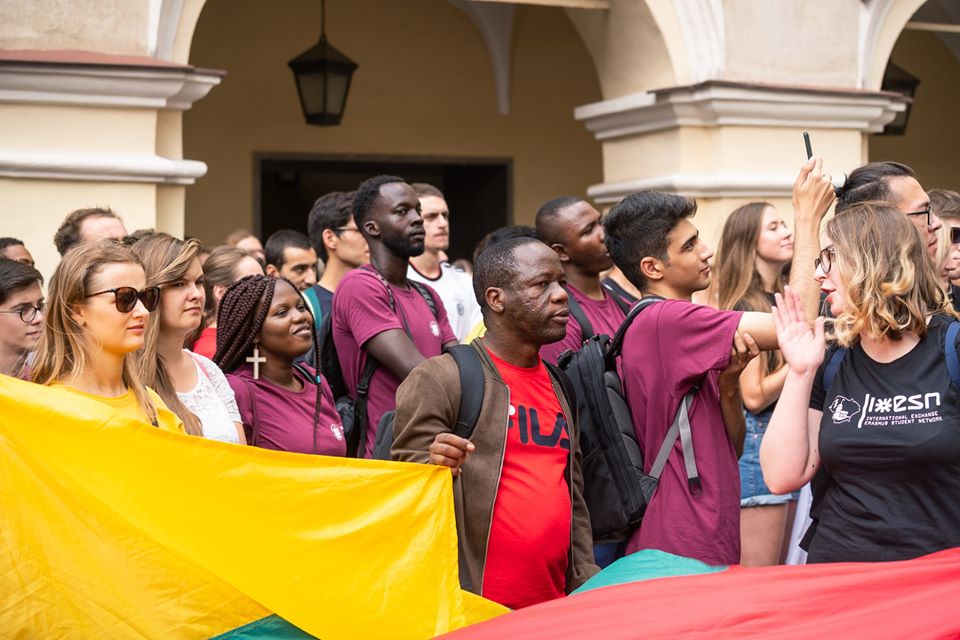
Be realistic while planning your expenses during your stay in Lithuania – it is essential that you have enough money for the whole duration of your study period!
The likely monthly living costs are provided below. These costs are based on a student who lives in Vilnius or Kaunas and has no dependents. Tuition fees, residence permit expenses and trips to your home country are not included.
The estimated cost of living per month:
It may seem that living in Lithuania can be quite expensive but there are few ways to ensure yourself a good living (although please keep in mind that you must be able to maintain financial stability during the whole study period even without these options). The first option for you would be to get a student loan (if you are an EU student) or get a scholarship. The other option for you would be to get a part-time job.
Working in Lithuania
Degree students are allowed to work not more than 20 hours per week, in accordance with the Lithuanian legislation.
For Citizens From the EU/EEA:
If you are a citizen of the European Economic Area (EEA) or Switzerland, you have a right to work in Lithuania. The citizens of EU states and the members of their families, who move to Lithuania for more than three months, are issued the certificate of a set form by the Minister of the Interior every six months that gives their right to live in the country. The same regulations are applied to citizens of the countries of the European Free Trade Association. The family members of citizens of the EU who are not citizens of the EU are issued EU residence permits.
For citizens from non-EU/EEA countries:
If you are a non-EU citizen who has a temporary residence permit or National visa (visa D) can work 20 hours per week during the semester and full-time during the summer holidays. During their studies, non-EU citizens, who have been issued a residence permit or National visa (visa D) on the basis of studies are exempted from the obligation to obtain a work permit.
Job Search:
We recommend that you should look for a job on the Internet, take part at the Vilnius University “Karjeros dienos” (Career Days) events or contact the organizations that you would like to work at.
These are the websites where you could find some relevant job offers: workinlithuania.lt, cvonline.lt, cvmarket.lt, etc
Health Matters:
112 IS THE EMERGENCY NUMBER TO CALL IN URGENT CASES!
Health Insurance
All international students are supposed to have medical insurance valid in Lithuania for the study period (it can be obtained each year).
Health Insurance EU Students:
Students who are the citizens of European Union member countries are required to either have a European Health Insurance Card (EHIC) or form E111 confirming that the student has EU health insurance, valid in Lithuania.
Students who hold a European Health Insurance Card can get medical help by consulting their prescribed family doctor (GP) at any health care institution that has a contract with the Territorial Health Insurance Fund (THIF). Your family doctor could send you to a specialist if in need. Both – visiting your family doctor or a specialist are fully covered if the doctor has a contract with one of the territorial health insurance funds.
The cost of dental treatment services is also covered for holders of EHIC who visit dentists that have contracts with THIF (although it is the patient’s obligation to pay for the materials). Such dentists usually work in national health care institutions. Most dentists in Vilnius work privately and payment for full treatment is usually needed.
EU students who have private health insurance shall at first cover all of those health care expenses and then inform their health insurance company in order to get a refund – unless the insurance policy states otherwise.
Medicines are usually only included in the hospitalization cost, while medicines prescribed by doctors have to be bought by patients. Prescribed subsidized medicines are partly covered by the national health insurance fund (Lithuanian: Valstybinė ligonių kasa – VLK) for EHIC holders. Any outstanding amount has to be paid by the patient. You will have to pay the full price for any pharmaceutical which is not listed in the national price list of subsidized medicines.
Health Insurance For Non EU-Students:
All students who are citizens of non-EU member countries are required to obtain health insurance either in their home country or Lithuania.
The cost of health insurance obtained in Lithuania may vary from around 50 to 150 EUR per year depending on the insurance policy (mainly on what part of the treatment cost is covered). This has to be done by contacting one of the private insurance companies if the student does not have a Permanent Residency Permit (if so, local THIF has to be contacted).
Students from non-EU countries applying for the visa have to prove to the Migration Office that they have valid health insurance. The following requirements for the insurance contract (policy) have to be fulfilled:
The health insurance contract (policy) shall guarantee that all basic medical assistance costs and travel expenses which may arise in connection with the return, for health reasons, of an alien to the homeland (medical transportation, including escort by medical brigade or a doctor) will be covered.
The following information shall be indicated in the insurance policy:
Number of the Health Insurance Contract (policy);
Particulars of the insurance undertaking (name, address of registered office, telephone and fax numbers);
Full name of the insured person;
The amount covered by the Health Insurance Contract;
Duration of the Health Insurance Contract (at least by the end of the study period);
The territorial coverage of Health Insurance Contract (policy);
Non-insured events.
Accommodation
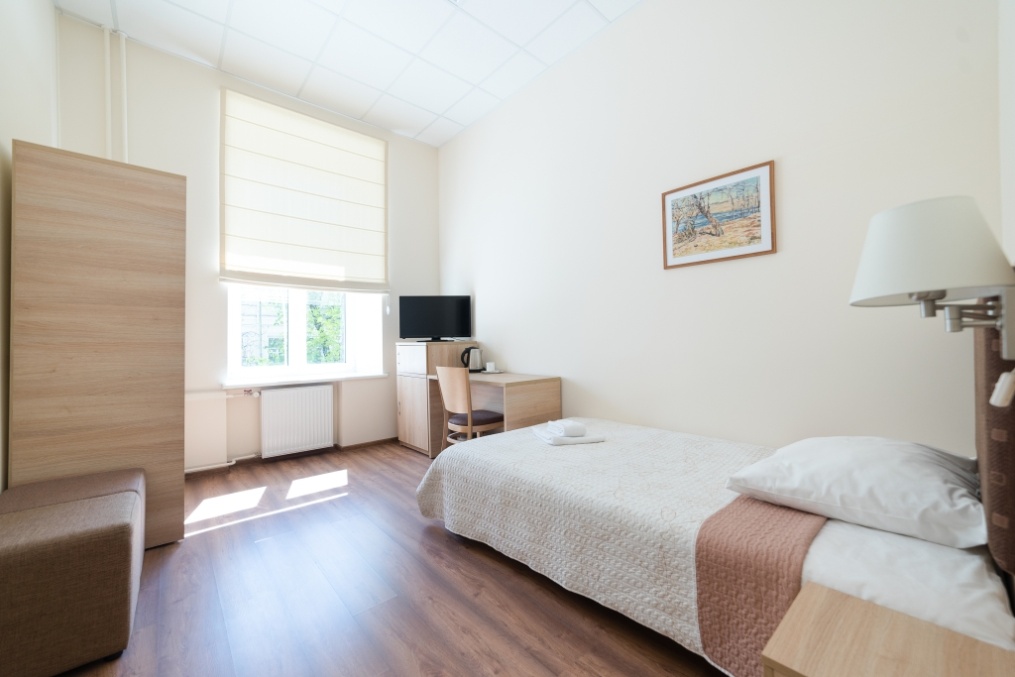
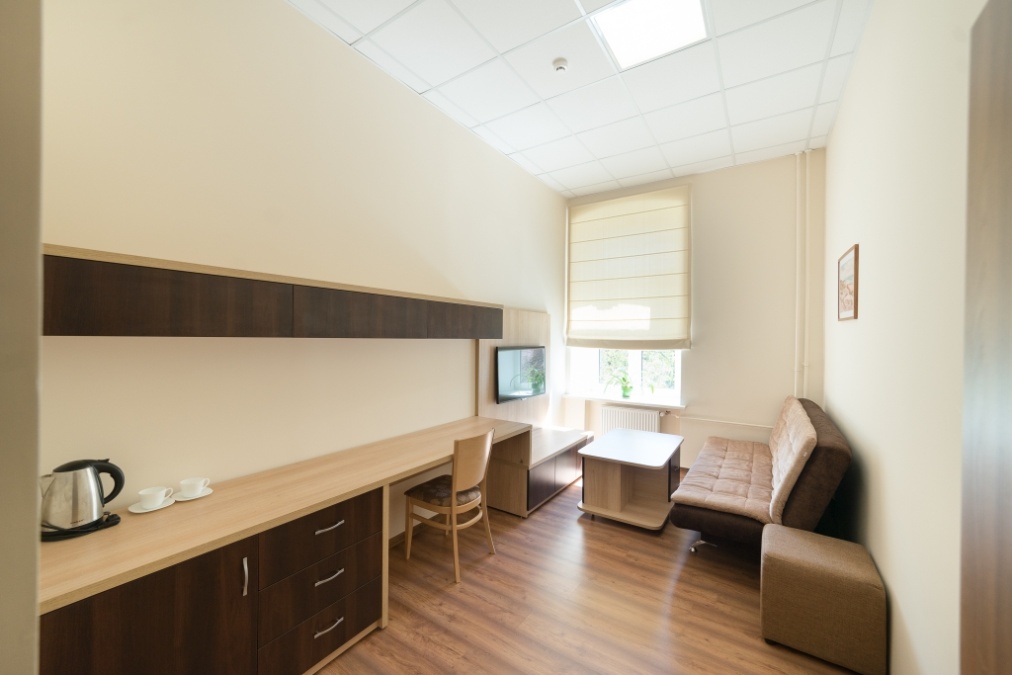
There are many accommodation options for international students in Vilnius. We strongly suggest you to choose Vilnius University dormitories because they are situated as close to the academic campuses as possible, charge modest fees and give you a better opportunity to interact with other students.
Accommodation in Vilnius University dormitories is available only for Vilnius University students during the academic year (i.e. from September 1st until June 30th).

